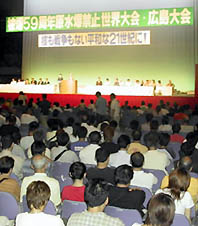
On August 4, Gensuikin (Japan Congress Against Atomic and Hydrogen Bombs) held its opening ceremony of its 59th international gathering at the Hiroshima Prefectural Sports Center in Naka-ku, Hiroshima. Roughly 3,500 attended the meeting, which was dominated by calls to strengthen the peace movement and inherit the A-bomb experience on the eve of the 60th anniversary of the atomic bombing.
Participants prayed and held a moment of silence for the peaceful repose of the hibakusha (survivors) who have passed away. In his opening remarks, Gensuikin Chair Shigetoshi Iwamatsu said, "Japan must engage in the peace movement not only as a victim of war, but also take responsibility as a perpetrator." Hiroshima Mayor Tadatoshi Akiba, a guest speaker, called for the abolition of nuclear weapons by 2020.
Also today, Gensuikyo (Japan Council Against Atomic and Hydrogen Bombs) held the closing ceremony of its 2004 world confab at Hiroshima Kosei Nenkin Hall in Naka-ku with roughly 260 in attendance. Gensuikyo positioned the 60th anniversary of the bombing as the "Year of International Action to Free Humanity from the Terror of Nuclear Weapons" and adopted an international conference declaration calling for a stronger peace movement.
Then Gensuikyo moved its venue to the Hiroshima Prefectural Sports Center in Naka-ku for the opening ceremony of the Hiroshima meeting attended by roughly 7,800 persons. After greetings from officers of Hidankyo (Japan Confederation of A- and H-Bomb Sufferers Organizations), Mayor Akiba, and others, Mohamd Ezz El Din, the assistant minister of Foreign Affaires for Multilateral Relations, Arab Republic of Egypt, harshly criticized the entrenched nuclear deterrence argument long preached by the U.S. and other nuclear weapon states. He stated, "There can no longer be any logical basis for the possession or use of nuclear weapons."
(Caption)At Gensuikin's Hiroshima meeting, speakers called for nuclear abolition and inheriting the A-bomb experience.
    
|